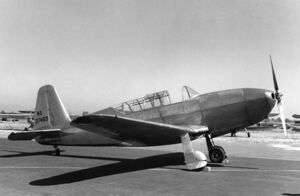Engineering:Atlas H-10
| H-10 | |
|---|---|

| |
| Role | Civil utility aircraft |
| Manufacturer | Atlas Aircraft |
| Designer | Max B. Harlow |
| First flight | 4 October 1945 |
| Number built | 1 |
The Atlas H-10 was the prototype for a four-seat cabin monoplane aircraft, registered N37463, designed by Max Harlow, which was flown in the United States shortly after World War II.
History
The Atlas H-10 had been constructed from the unfinished Harlow PJC-4 sporting monoplane which had been left uncompleted at the outbreak of the conflict. The water heater company Rheem Manufacturing Company briefly invested in the project as the PCC-10 (Pasadena City College Model 10) but did not pursue the business. Pasadena students completed the aircraft, and its first flight was on 4 October 1945 with a 220 hp Lycoming.[1]
It was a low-wing cantilever monoplane of aluminum semi-monocoque configuration with retractable tailwheel undercarriage and powered by a variety of engines throughout its life. Originally powered by a Lycoming O-435, it was re-engined with two Continental O-300s driving contra-rotating propellers through a common gearbox and registered as the Mono-Twin. In turn, this arrangement was replaced with a Franklin 6AB and finally a Lycoming IO-720, each driving a single propeller. The cabin layout was also modified.
Operational history
Only the single H-10 was completed and flown. In the early 1970s it was based at Long Beach Airport in southern California.
As of 2006, the aircraft was reportedly still in existence in a dismantled state in the hands of a California n collector.
Variants

- Harlow PJC-4
- Original design
- Atlas PCC-10
- Test aircraft
- Atlas H-10
- Redesignated production aircraft
- Atlas Mono-Twin
- Re-engined prototype with twin radial
Specifications (with Continental engines)
General characteristics
- Crew: one pilot
- Capacity: three passengers
- Length: 28 ft 4 in (8.64 m)
- Wingspan: 35 ft 9 in (10.90 m)
- Powerplant: 2 × Continental O-300 , 145 hp (108 kW) each
Performance
- Maximum speed: 170 mph (274 km/h, 150 kn)
References
- ↑ "The Quiet Professor". Air Progress Sport Aircraft: 83.
- Taylor, Michael J. H. (1989). Jane's Encyclopedia of Aviation. London: Studio Editions. pp. 83.
- aerofiles.com
 |
